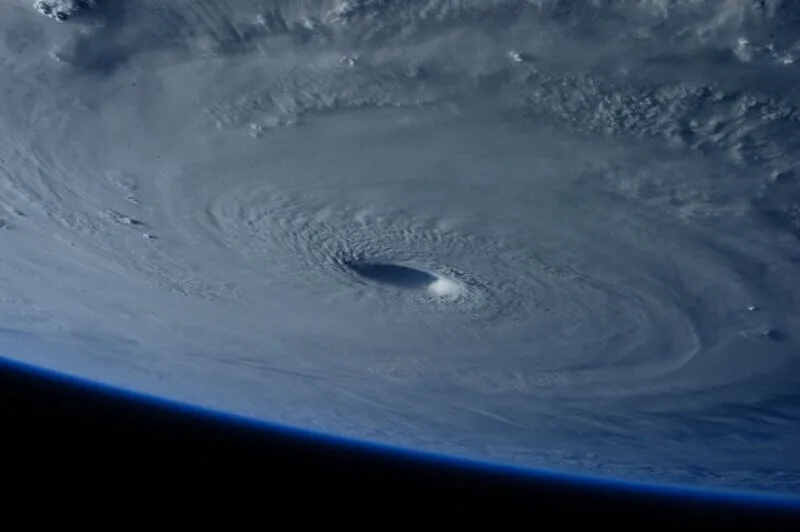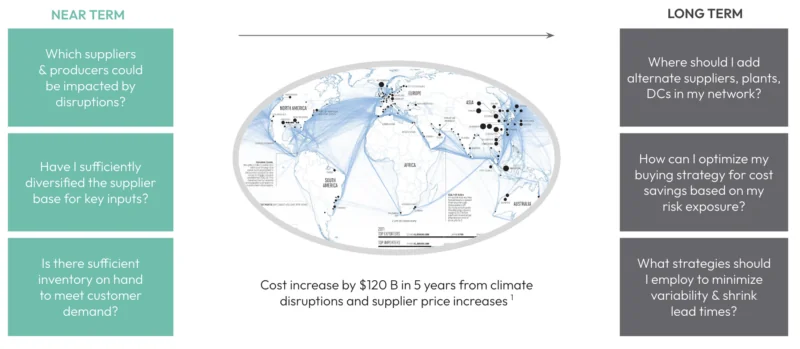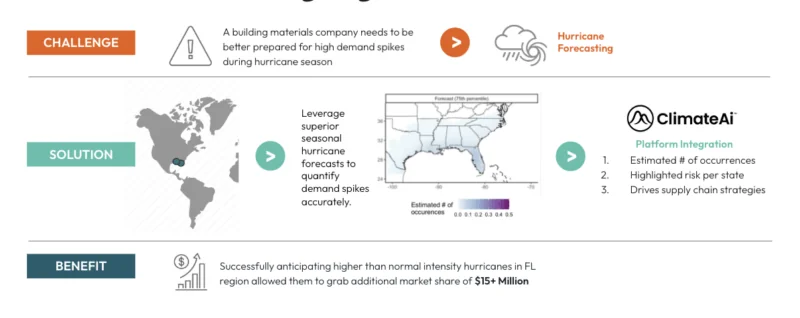New Product Launch: ClimateLens Monitor Yield Outlook - see regional and location-specific yields on key commodity crops, updated weekly. Learn More
Himanshu Gupta • September 20th, 2023.
In our era of mounting climate challenges, hurricane preparedness (or lack thereof) represents a formidable threat to business continuity. With NOAA’s forecast signaling an intensified 2023 hurricane season, the imperative for businesses to shift from reactive to proactive has never been clearer. Platforms like ClimateAi emerge at this crucial juncture, leveraging the power of AI to identify potential vulnerabilities and transform them into actionable opportunities.
As major weather events, hurricanes are significant economic and social equilibrium disruptors. Their aftermath impacts businesses beyond immediate physical damage — impacting global supply chains, changing economic dynamics, and altering consumer behavior.
Hurricane Ian in 2022 exemplified this. Beyond the evident destruction, businesses, from local shops to global giants, faced immediate challenges. Vital ports like Miami faced significant setbacks, disrupting trade and causing widespread supply chain issues.
Beyond logistics, agriculture suffered, manufacturers’ schedules were interrupted, and tech firms with just-in-time delivery models faced delays. Retailers braced for stock shortages, affecting their revenue projections.
Consumer behaviors shifted post-Ian, with a decline in luxury spending as priorities moved to reconstruction. Businesses had to quickly adjust their business strategies. Employees’ well-being and safety became paramount amid power outages and broken communication and transport networks. Continuing operations amidst the post-hurricane turmoil seemed almost impossible for many.
Hurricane Ian’s aftermath highlighted that the true hurricane costs aren’t just about immediate damages but also prolonged business disruptions, evolving consumer needs, and operational resilience tests. The message from Ian is clear: In our globally linked economy, businesses must proactively prepare for these complex hurricane-induced challenges.

At the heart of today’s heightened urgency is an irrefutable and pressing phenomenon: climate change. Our planet is experiencing more than just fleeting weather anomalies. We’re navigating a rapid atmospheric transformation, with global temperatures consistently rising and 2023 on track to be the hottest year on record. This upswing in heat isn’t the only discomforting factor; it’s becoming the precursor to storms’ increasing frequency and ferocity.
For the corporate world, these implications can’t be overstated. Weather events have moved from mere footnotes in environmental journals to headlining boardroom discussions. They are no longer abstract, distant threats but palpable business realities. Each sweltering heatwave, torrential downpour, and hurricane seems to surpass its predecessors in might, leaving many industries at a crossroads.
While still critical, we need to think beyond environmental stewardship. For businesses to thrive, consideration must be paid to safeguarding assets, ensuring continuity, and fortifying future growth against the impacts of the changing climate. Every unanticipated weather deviation now bears a question mark: Is the business resilient enough to weather it? And if not, what needs to change?
In reality, businesses can’t afford to wait until after a devastating extreme weather event like a hurricane to take action. With every weather anomaly, businesses are given a stark reminder that preparedness is an absolute necessity in today’s era of accelerating climate change.

This is where the groundbreaking capabilities of emerging technology come in. With AI as the linchpin, we can revolutionize hurricane preparedness:
Traditional meteorological methods, while valuable, can be limited in the face of climate change. To offer a broader picture, AI enables us to drill down to dissect vast datasets, converting them into actionable climate forecasts that show business-specific impacts. This granularity ensures businesses can chart precise trajectories of impending hurricanes with greater lead time, giving them ample opportunity for risk mitigation and strategic recalibration.
Equipped with these predictive insights, companies can seamlessly transition to modes of proactivity. Armed with actionable recommendations, they can reroute logistics and diversify suppliers, ensuring the uninterrupted flow of essential goods and commodities. Production lines can be shifted, inventory stocks adjusted, and service deliveries optimized to work around the storm’s impact. Businesses can also optimize long-term strategies by identifying opportunities for new climate-smart expansion locations or increased demand for weather-dependent goods.
AI-driven insights enable companies to forecast market behaviors post-disasters. Businesses can craft resonant sales and marketing campaigns by anticipating product and service demands in storm-affected areas. Moreover, businesses can actively engage in community rebuilding efforts by leveraging AI. These engagements not only enhance brand loyalty but also fortify community bonds.
The sophisticated capabilities of climate resilience technologies are far from mere conceptual advantages—they have consistently demonstrated transformative impacts in real-world business contexts.

When faced with the brunt of unpredictable climate-driven variations, Advanta Seeds, a top-tier Australian seed business, struggled to maintain consistent seed production and sales. Conventional data sources and prevalent climate tools failed to address their specific needs for granular, time-sensitive insights.
Two central challenges dominated their business trajectory:
Advanta’s annual revenue showcased a significant swing, with a 30-50% fluctuation, hinging primarily on the appropriateness of their market product. This uncertainty was magnified by a single product’s development cycle spanned a decade. Any misjudgment about future climates could plunge the company into recurring heavy losses.
Advanta required tangible metrics to navigate future market shifts and strategies. They aimed to gauge the forthcoming demand for their seeds and understand the transformation of their current sales geographies, ensuring they remained well-positioned in flourishing markets.
This is where ClimateAi, with its innovative ClimateLens-Enterprise platform, came into the picture. By offering cutting-edge seasonal and long-term climate forecasts alongside a unique climate analogs search function, ClimateAi empowered Advanta to identify and address pivotal risks in their production and sales sectors.
Advanta leveraged ClimateAi’s timely forecasts of impending wet conditions during harvest season. This foresight led to a strategic decision to harvest earlier than initially planned, conserving seed quality and market value. This proactive measure translated into staving off potential losses ranging from hundreds of thousands to millions of dollars in a single season.
Additionally, ClimateAi’s precise predictive tools pinpointed an unforeseen rainfall event two months ahead of its occurrence in a crucial sales region. Capitalizing on this knowledge, Advanta efficiently bagged and shipped seeds to this location ahead of its competitors, securing a sales boost between 5-10%.
The synergy between Advanta Seeds and ClimateAi underscores the profound impact of harnessing AI-driven climate insights in today’s volatile environmental landscape.
Equally compelling is the narrative of a leading roofing materials producer. In an industry where weather plays a pivotal role, the stakes are high, and predictive capabilities aren’t a luxury; they are a necessity. By incorporating insights from ClimateAi’s ClimateLens Monitor, this producer didn’t merely respond to hurricanes and storms; they anticipated them. These proactive strategies enabled them and other businesses, like agriculture and propane fuel provider Growmark, to streamline operations, optimize supply chains, and ensure uninterrupted service deliveries. In a nutshell, ClimateAi didn’t just offer them predictions; it provided a roadmap to operational excellence.

These success stories underscore a singular truth: AI tools are an effective and increasingly necessary means to succeed in the business landscape of our climate-challenged era.
Stepping back, it’s evident that hurricane preparedness isn’t an isolated endeavor. It’s woven into the larger tapestry of a business’s climate risk mitigation strategy. As the storm clouds of future hurricanes gather, companies must integrate AI-driven climate risk evaluations into their core strategy.
The ongoing 2023 hurricane season underscores a dual narrative: the pressing challenge of intensified storms and the unprecedented opportunity businesses have to take cover. For modern companies, resilience means seizing the moment for innovation, growth, and community impact. As AI-powered solutions continue to demonstrate their predictive and analytic capabilities, enterprises have the tools to survive and thrive amidst the tests that hurricane preparedness represents.